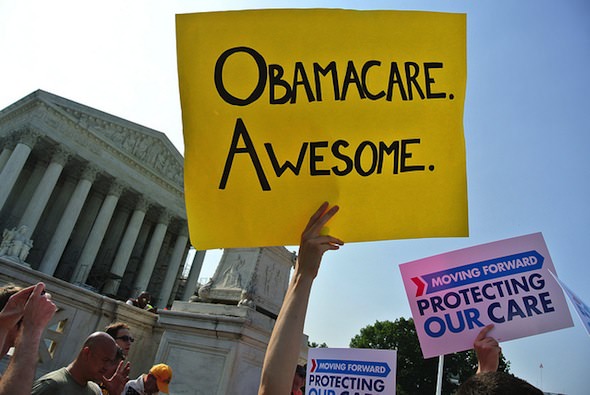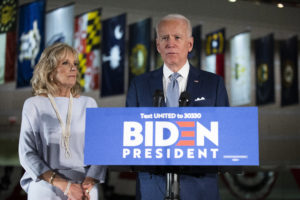A Victory Lap for Obamacare
All the naysaying in the world can't drown out mounting evidence that the Affordable Care Act, President Obama's signature domestic achievement, is a real success.
WASHINGTON — It’s all over but the shouting: Obamacare is working.
All the naysaying in the world can’t drown out mounting evidence that the Affordable Care Act, President Obama’s signature domestic achievement, is a real success. Republican candidates running this fall on an anti-Obamacare platform will have to divert voters’ attention from the facts, which tell an increasingly positive story.
A new report by the nonpartisan Congressional Budget Office estimates that, despite all the problems with the HealthCare.gov website launch, 12 million people who previously lacked insurance will obtain coverage this year. By 2017 — the year Obama leaves office — the CBO predicts that an additional 14 million uninsured will have managed to get coverage.
Why was the Affordable Care Act so desperately needed? Because without it, 54 million Americans would presently have no health insurance. Within three years, according to the CBO, Obamacare will have slashed the problem nearly in half.
We should do better, and perhaps someday we will. Most industrialized countries have some kind of single-payer system offering truly universal coverage. But if you have to work within the framework of the existing U.S. health care system — which involves private health insurance companies and fee-for-service care — the Affordable Care Act reforms are a tremendous advance.
Many Republican critics of Obamacare know, but refuse to acknowledge, that the reforms are here to stay. Does the GOP propose to let insurance companies deny coverage because of pre-existing conditions, as they could before the ACA? Does the party want to reimpose lifetime caps on the amount an insurer will pay? Tell young adults they can no longer be covered under their parents’ policies?
I didn’t think so.
More likely, Republicans will continue to mumble vaguely about “private-sector incentives” and “consumer choice” — without acknowledging that the ACA reforms offer plenty of both. And the GOP will continue to bray about “big government health care,” which is an out-and-out lie.
Obamacare, to the contrary, will leave the present system basically intact. The CBO predicts that a decade from now, the great majority of non-elderly Americans will still obtain health insurance through their employers — an estimated 159 million, as opposed to 166 million if Obamacare never existed. Only about 25 million people are expected to get coverage through the federal and state health insurance exchanges. Even this coverage, mind you, will be provided by private health insurance companies, not the government.
So, to recap: The Affordable Care Act is a cautiously designed set of reforms whose impact on most people is approximately zero. It is well on the way toward its goal of providing coverage to the uninsured.
Given all the good news — including the fact that 7.5 million people have now signed up for insurance through the state and federal exchanges, more than projected — you’d think that Republicans might start looking for another issue to run on in the fall. But you’d be wrong.
There is no sign that GOP strategists intend to let facts get in the way of their story. After spending so much time and effort trying to make “Obamacare” a synonym for “bogeyman,” Republicans have no graceful way to acknowledge that the program is actually a success.
All the apocalyptic end-of-freedom rhetoric that we continue to hear from the far right sounds increasingly ridiculous to moderate voters who have no strong party allegiance. But the GOP’s activist base continues to respond with campaign donations and raring-to-go enthusiasm — factors that can make the difference in a midterm election when moderate voters often stay home.
To do well in the fall, Democrats have to infuse their most loyal voters with similar enthusiasm. The success of Obamacare will help. Already, polls are showing upticks in support for embattled Democratic incumbent senators in Louisiana, Arkansas and Alaska. Democrats control their own destiny in November: If they can get their voters to the polls, they’ll win.
In the long run, no matter what happens in the election, I’m more convinced than ever that the Affordable Care Act will be seen as landmark legislation. With minimal immediate impact, the ACA does two tremendously important things.
First, it shifts the incentive structure in the health care industry in ways that promise to hold down rising costs. And second, it establishes the principle that health care should be considered a right, not a privilege.
Of course it’s not perfect. It’s a thing of beauty anyway. We have liftoff. It’s working.
Eugene Robinson’s email address is [email protected].
©2014, Washington Post Writers Group
Your support matters…Independent journalism is under threat and overshadowed by heavily funded mainstream media.
You can help level the playing field. Become a member.
Your tax-deductible contribution keeps us digging beneath the headlines to give you thought-provoking, investigative reporting and analysis that unearths what's really happening- without compromise.
Give today to support our courageous, independent journalists.






You need to be a supporter to comment.
There are currently no responses to this article.
Be the first to respond.